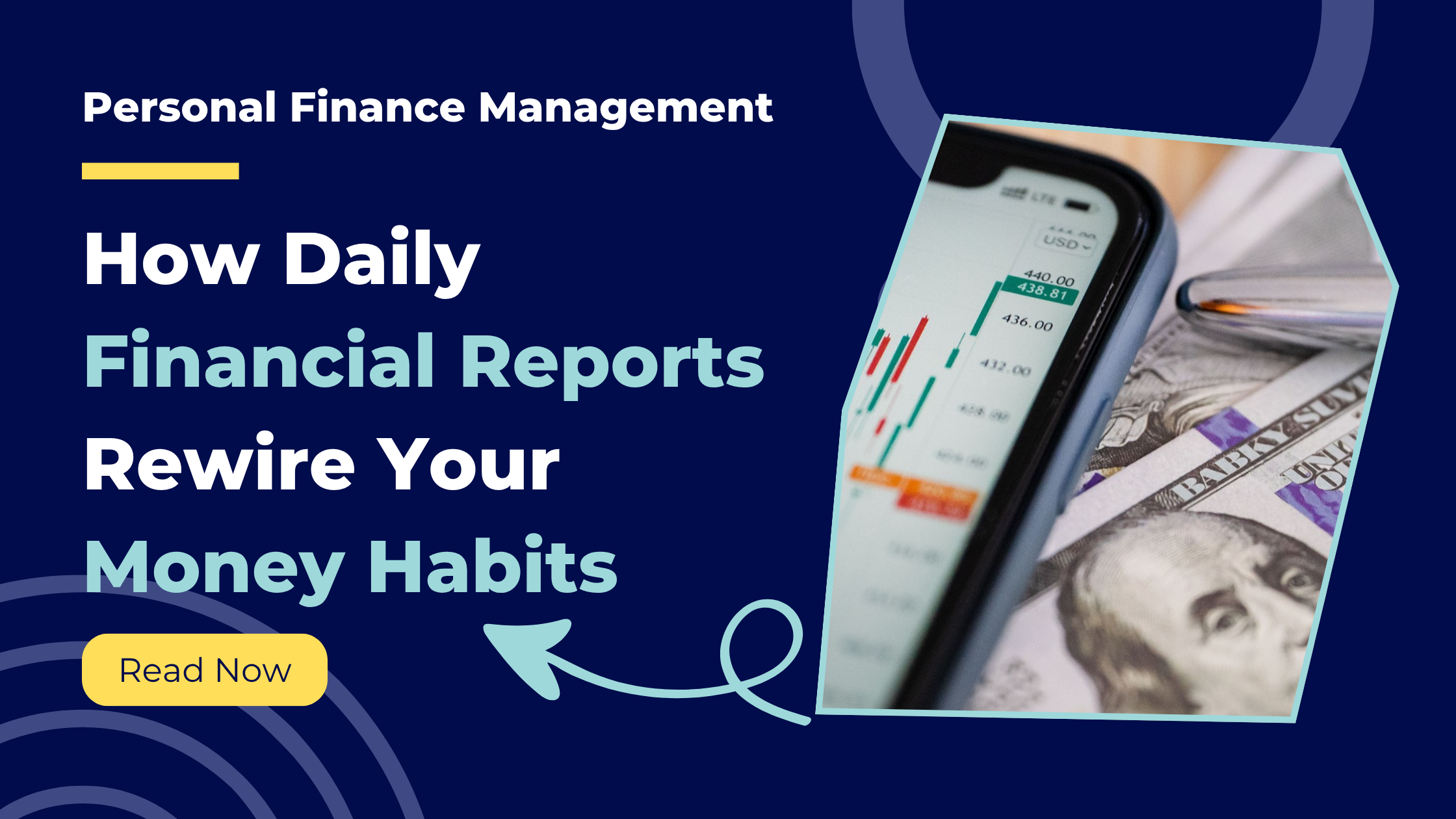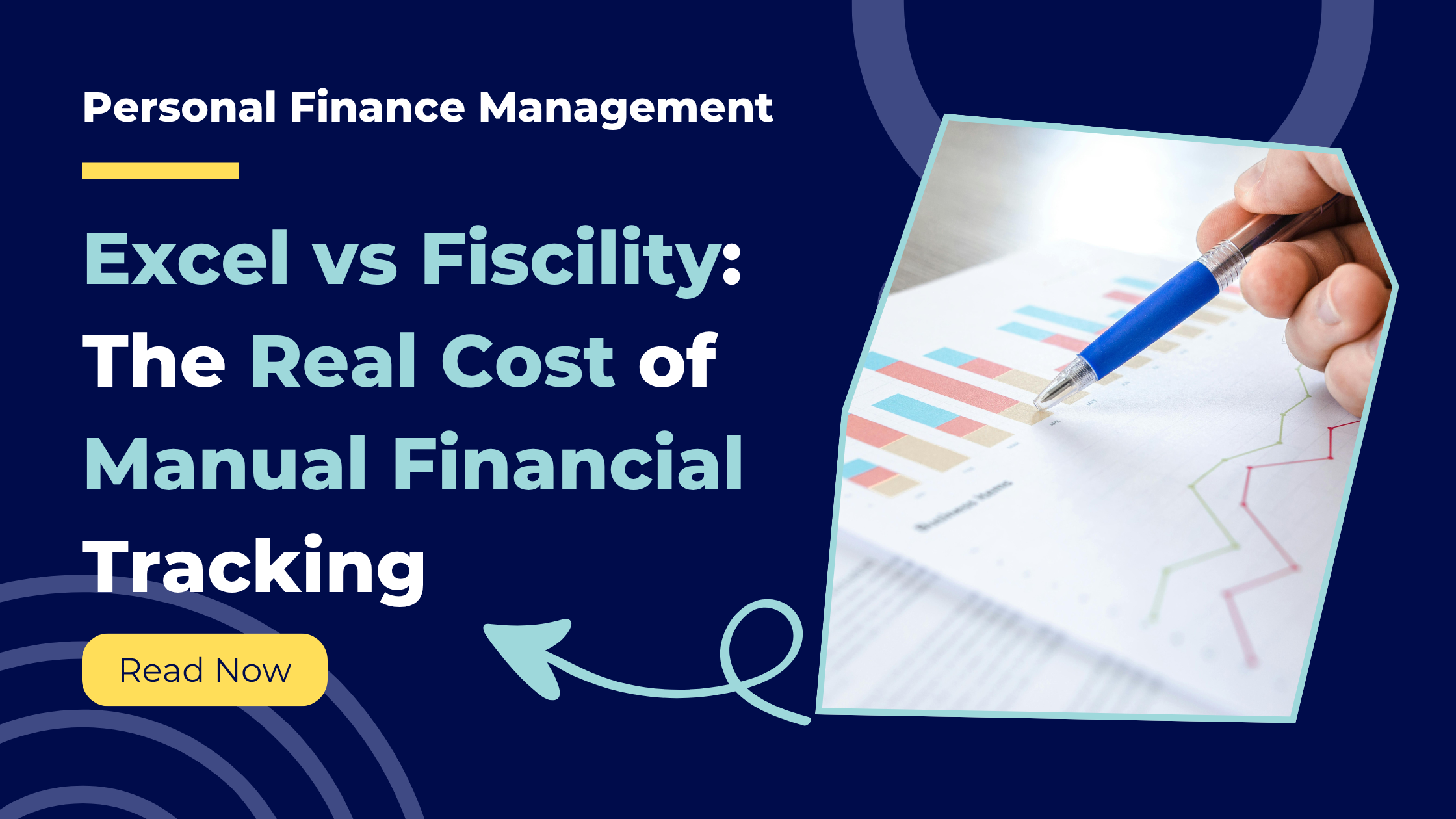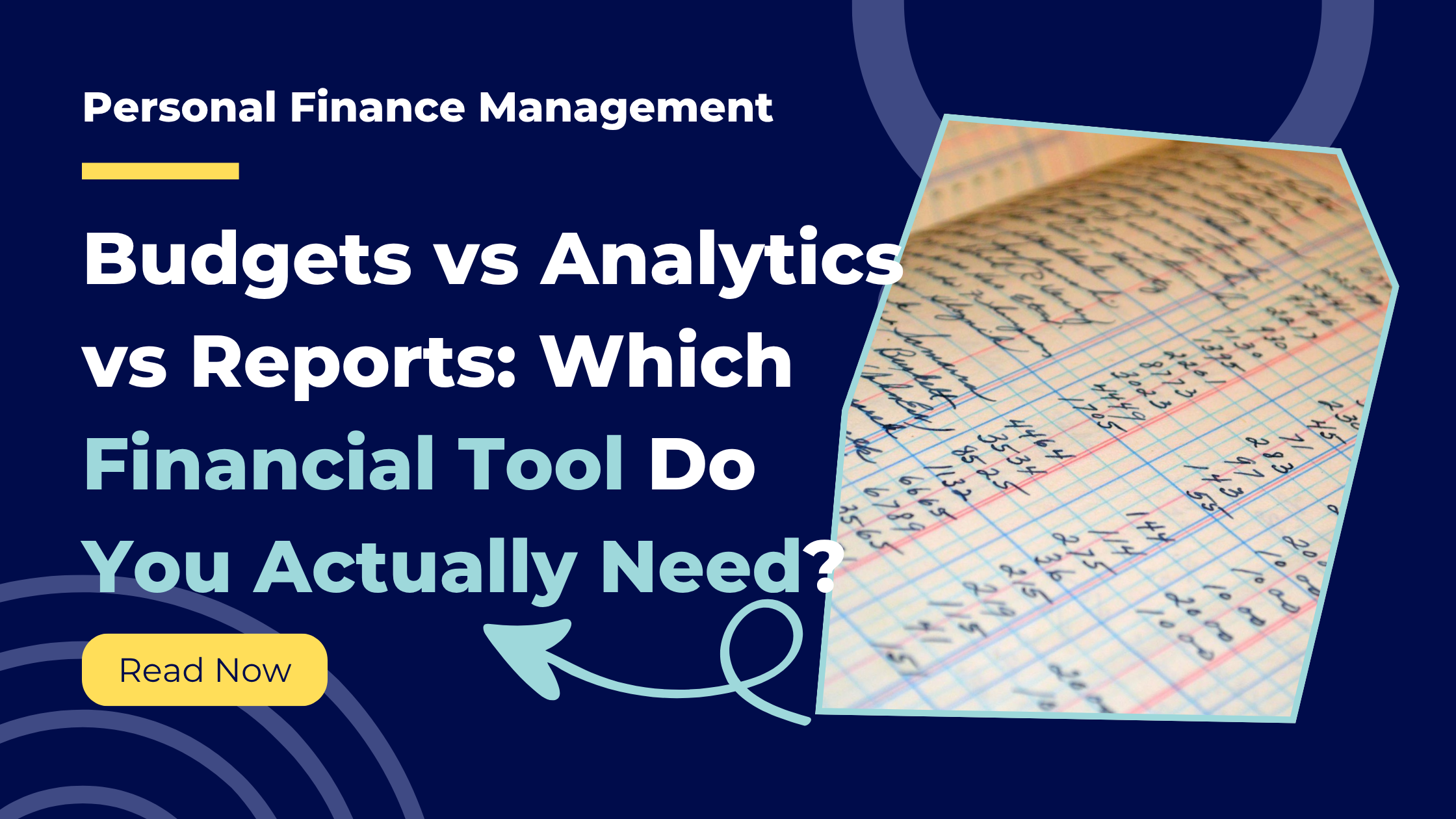
•
1 min read
How Daily Financial Reports Rewire Your Money Habits
Daily financial visibility isn't just about tracking—it's about transforming reactive spending into intentional decisions through habit formation.
You don't think about brushing your teeth. You don't debate whether to check the weather before getting dressed. You don't need motivation to glance at your phone's battery level.
These behaviours are automatic—wired into your daily routine through repetition and consistent environmental cues. They require no willpower, no motivation, no conscious effort.
What if your financial awareness worked the same way?
The difference between people who feel in control of their money and those who feel perpetually stressed isn't discipline or intelligence. It's habit architecture. And daily financial reports are the environmental cue that transforms financial awareness from an effortful task into an automatic behaviour.
This isn't about budgeting harder. It's about understanding how habits form—and using that psychology to make good financial decisions the default rather than the exception.
The Habit Formation Framework: Why Daily Beats Monthly
How Habits Actually Form
Psychologist Wendy Wood's research on habit formation reveals a critical insight that most people misunderstand: habits don't form through willpower or motivation—they form through consistent environmental cues.
The habit formation cycle has three components:
1. Cue (the trigger)
A consistent signal in your environment that prompts a behaviour. This could be a time of day, a location, an object, or a preceding action.
2. Routine (the behaviour)
The action itself—what you actually do in response to the cue.
3. Reward (the benefit)
The positive outcome that reinforces the behaviour and makes your brain want to repeat it.
The key word is consistent. Habits form when the cue appears regularly and reliably, creating a predictable pattern your brain can automate.
Why Monthly Financial Reviews Fail
Most financial advice suggests monthly reviews: set aside time at month-end to analyse spending, reconcile accounts, adjust budgets, and reflect on financial goals.
This approach fails habit formation principles in multiple ways:
Inconsistent Cue
"End of month" isn't a reliable environmental trigger. It's a date on a calendar that requires you to remember and initiate. There's no automatic prompt.
High Friction Routine
Monthly reviews require gathering data from multiple sources, categorising transactions, performing calculations, and making interpretations. This cognitive load makes the behaviour effortful and easy to postpone.
Delayed Reward
The feedback loop is too long. You review October's spending in early November—when the information is historical and no longer actionable. The connection between behaviour and outcome is severed.
Infrequent Repetition
Twelve times per year isn't enough repetition to wire a behaviour into automaticity. Habit research shows that daily behaviours become automatic in 18-254 days, while monthly behaviours may never automate at all.
Monthly financial reviews aren't bad—they're just not habits. They're tasks that require ongoing motivation and discipline, making them inherently unsustainable for most people.
Why Daily Reports Create Lasting Habits
Daily financial reports flip every failure point of monthly reviews:
Consistent Cue
The report arrives at the same time every morning—a reliable environmental trigger that requires no memory or initiation. Your brain learns: "Morning coffee = financial report."
Low Friction Routine
Opening an email and scanning pre-processed information takes 30 seconds. The behaviour is so easy it happens almost unconsciously.
Immediate Reward
The report provides instant clarity. You immediately know your position, which reduces uncertainty and creates the psychological safety that serves as the reward.
Daily Repetition
365 repetitions per year creates the frequency needed for true automaticity. Within weeks, checking your daily report becomes as natural as checking your phone.
This isn't theory—it's documented psychology. When the environmental cue is consistent and the behaviour is low-friction, your brain automates the pattern.
The Feedback Loop Effect: How Daily Visibility Accelerates Learning
Pattern Recognition in Action
Your brain is exceptional at detecting patterns—when given regular data to work with.
With monthly financial reviews, you see twelve data points per year. With daily reports, you see 365 data points. This isn't just "more information"—it's fundamentally different learning conditions.
Daily financial reports allow you to notice patterns that remain invisible at monthly intervals:
Weekly Cycles
"My spending spikes on Fridays and Saturdays" becomes obvious with daily data but disappears in monthly aggregates.
Behavioural Triggers
"I spend more after stressful workdays" or "I order takeaway every time I work late" only become visible when you can correlate specific days with specific spending.
Income Impact
"The three days after payday show significantly higher discretionary spending" is a pattern you'll spot within a month of daily reports.
Seasonal Variations
"My petrol spending increases 30% during school holidays" emerges clearly when you see daily changes across multiple months.
These aren't insights you gain from monthly summaries—they're discoveries that emerge from high-frequency observation.
The Proximity Principle: Connecting Actions to Outcomes
Behavioural psychology demonstrates that learning accelerates when feedback is immediate.
This principle explains why:
- Athletes improve faster with real-time performance data
- Language learners progress more rapidly with instant correction
- Skill acquisition speeds up with immediate result visibility
The same mechanism applies to financial behaviour.
Monthly Review Scenario:
- You order takeaway on 8 October
- You review spending on 1 November
- The connection between that specific choice and its impact is lost in 23 days of other transactions
- No meaningful learning occurs
Daily Report Scenario:
- You order takeaway on Tuesday evening
- Wednesday morning's report shows yesterday's spending
- You immediately see: "£42 dining out yesterday, total weekly spend now £287 of £450 budget"
- The connection between action and outcome is crystal clear
This temporal proximity creates rapid learning. You start to notice:
- "That coffee shop trip added £6.40—is that worth it today?"
- "Grocery delivery costs £18 more than in-store shopping—worth the convenience?"
- "That impulse Amazon purchase shifted my weekly position significantly"
The feedback loop tightens from 30 days to less than 24 hours. Financial learning that used to take years now happens in weeks.
Micro-Corrections Replace Crisis Management
Pilots don't wait until fuel reaches critical levels to adjust course. They make constant micro-adjustments based on continuous instrument feedback.
Daily financial reports enable the same approach:
Without Daily Reports:
You discover in early November that October's spending exceeded budget by £640. Now you face difficult choices: cut back dramatically in November, dip into savings, or accept the overrun and adjust December's budget.
With Daily Reports:
- Week 1 of October: "Spending tracking slightly high—£287 in 7 days"
- Week 2: "Still elevated—£563 total, might exceed monthly budget if this continues"
- Week 3: Small adjustment—skip one restaurant meal, choose cheaper grocery options
- Week 4: "Back on track—£780 total with one week remaining and £220 buffer"
The final outcome is the same—staying within budget—but the experience is radically different. One approach requires crisis intervention and sacrifice; the other uses gentle course corrections that barely register as restrictions.
Small adjustments made early prevent large problems later.
The Accountability Mirror: Self-Monitoring Changes Behaviour
Why Observation Alone Changes Outcomes
Research on self-monitoring behaviour reveals a fascinating phenomenon: the simple act of measuring and observing a behaviour changes that behaviour—even without conscious intervention.
Studies demonstrate this across domains:
- Fitness trackers increase daily step counts by an average of 2,500 steps, even when users don't consciously try to walk more
- Food journals reduce caloric intake by 15-20%, even without calorie counting or dietary restrictions
- Time-tracking software increases productivity by 12-18%, even without manager oversight or quotas
This is the "accountability mirror effect"—when you know you'll be observing your own behaviour, you naturally adjust that behaviour toward your stated goals.
Daily financial reports create the same dynamic for spending.
The Psychological Weight of Future Visibility
Before daily reports, financial decisions exist in a psychological vacuum:
- You make a purchase
- It disappears into the abstract concept of "spending"
- The individual impact remains invisible
- No specific accountability exists
With daily reports, every financial decision carries psychological weight:
- You make a purchase
- You know it will appear in tomorrow morning's report
- The future visibility creates a moment of conscious reflection
- "Do I actually want this, or am I spending reactively?"
This isn't guilt or shame—it's mindfulness. The knowledge that you'll see this decision reflected back at you tomorrow creates a brief pause, a moment of intentionality that interrupts automatic spending patterns.
Over time, this accumulation of mindful moments rewires your default approach to money.
Natural Goal Alignment Without Force
Traditional budgeting often feels like deprivation: you set spending limits and then fight against your impulses to stay within them. This requires constant willpower and creates psychological resistance.
Daily reports work differently. They don't restrict—they inform.
When your financial goals are made visible daily, your decision-making naturally aligns with those goals without feeling restrictive:
Goal: Build £5,000 emergency fund by year-end
Daily Report Shows:
- Current emergency fund: £2,840
- Monthly savings rate: £420
- Months remaining: 5.2
- Projected year-end total: £5,024
This visibility doesn't force behaviour change—it enables it. You see clearly that maintaining your current £420 monthly savings rate will achieve your goal. That one restaurant splurge won't derail anything. But consistently reducing savings contributions will miss the target.
The information empowers choice rather than imposing restriction.
Building Financial Self-Efficacy Through Mastery Experiences
What Self-Efficacy Actually Means
Psychologist Albert Bandura's concept of self-efficacy—your belief in your ability to succeed in specific situations—is one of the most powerful predictors of behavioural success.
People with high financial self-efficacy:
- Set more ambitious financial goals
- Persist longer when facing financial challenges
- Experience less financial stress and anxiety
- Make better long-term financial decisions
- Recover faster from financial setbacks
The critical question: how do you build financial self-efficacy?
Bandura's research is clear: through mastery experiences—repeated successful interactions with the domain you're trying to master.
The Daily Cycle of Financial Mastery
Daily financial reports create a continuous cycle of small mastery experiences:
Morning: You see your financial position clearly
Day: You make an informed spending decision based on that clarity
Next Morning: You see the outcome of yesterday's decision
Day: You make another informed decision, slightly better calibrated
Next Morning: You see improvement, building confidence
Each cycle reinforces the belief: "I can manage my money effectively."
This is fundamentally different from monthly cycles where the gap between decision and outcome is so long that the learning connection breaks down.
Compare:
Monthly Cycle:
30 days of decisions → One moment of outcome visibility → Vague sense of "did well" or "did poorly"
Daily Cycle:
1 day of decisions → Next-day outcome visibility → Clear cause-effect understanding → Immediate behaviour adjustment → Visible result
The daily cycle provides 30x more mastery experiences per month. This accelerated learning builds financial confidence exponentially faster.
From External Validation to Internal Confidence
Initially, financial confidence often depends on external validation: a financial advisor saying "you're doing well," a partner approving purchases, or hitting a round-number savings milestone.
Daily reports shift this to internal confidence. You develop an intuitive sense of your financial position and capabilities:
- "I can afford this"—not as wishful thinking, but as data-informed certainty
- "I should wait on this"—not as deprivation, but as strategic choice
- "I'm on track"—not as hope, but as observable fact
This internalised confidence is self-reinforcing. The more you successfully manage money based on clear information, the more confident you become. The more confident you become, the better decisions you make.
Making Habit Formation Effortless: The Fiscility Approach
The Automation Imperative
Understanding habit formation psychology is valuable. Implementing it manually is nearly impossible.
Creating your own daily financial reports requires:
- Logging into multiple bank accounts every morning
- Manually categorising transactions
- Calculating balances across accounts
- Computing discretionary funds after committed expenses
- Tracking trends and comparing to previous periods
- Formatting the information clearly
This process takes 15-20 minutes daily. Within a week, life gets busy. The habit breaks. The psychological benefits disappear.
Fiscility eliminates every friction point:
Automatic Data Aggregation
All accounts synchronised automatically. No logging in. No manual data entry.
Intelligent Processing
Transactions categorised by machine learning. Metrics calculated automatically. Trends identified without manual analysis.
Consistent Delivery
Report arrives at exactly the same time every morning—the consistent environmental cue essential for habit formation.
Zero Effort Required
After initial setup, the system runs entirely automatically. You simply receive the daily report.
The 30-Second Habit
With Fiscility, financial awareness becomes a simple morning ritual:
7:30am: Daily report arrives in inbox
7:31am: Open email, scan position (5-second snapshot)
7:32am: Check weekly spending if needed (30-second review)
Rest of day: Make informed financial decisions based on morning clarity
That's the entire habit: 30 seconds each morning, automatically triggered by a consistent cue (the report arrival), with immediate reward (clarity and confidence).
Within 2-3 weeks, this becomes completely automatic—as natural as checking the weather.
Design for Habit Sustainability
Fiscility's daily reports are specifically designed around habit formation psychology:
Consistent Timing
Same time every morning creates reliable environmental cue
Progressive Disclosure
Three-layer information hierarchy (5-second snapshot → 30-second weekly → 2-minute monthly) matches natural information processing
Visual Clarity
Clean design reduces cognitive load, making the behaviour effortless
Immediate Relevance
Answers the questions you're actually asking today
Positive Reinforcement
Progress indicators provide psychological reward for good financial behaviour
These aren't aesthetic choices—they're psychological tools that make daily financial awareness sustainable indefinitely.
Key Takeaways: Habits Beat Willpower
Habits form through consistent cues, not motivation
Daily financial reports provide the environmental trigger necessary for automatic behaviour. Monthly reviews require ongoing willpower and inevitably fail.
Daily feedback accelerates learning exponentially
365 data points per year vs 12 creates pattern recognition and cause-effect clarity that monthly reviews cannot provide.
Self-monitoring changes behaviour automatically
The knowledge that you'll see today's decisions in tomorrow's report creates natural mindfulness without guilt or restriction.
Mastery experiences build financial confidence
Each daily cycle of see-decide-observe-improve reinforces your belief in your ability to manage money effectively.
Automation is the only sustainable approach
Manual daily financial tracking fails when life gets busy. Automated systems that require zero effort are the only way to maintain the habit long-term.
Closing Reflection
Financial control isn't about having more discipline. It's about having better habits.
And habits don't come from trying harder—they come from environmental design that makes good behaviour automatic.
Daily financial reports aren't just a monitoring tool. They're a habit formation system that rewires your relationship with money at a fundamental level.
The question isn't whether you should check your finances daily. The question is: are you ready to make it effortless?
Build Unbreakable Financial Habits
Fiscility delivers automated daily financial reports that transform financial awareness from an effortful task into an automatic morning habit.
What you'll build:
- Automatic financial awareness through consistent morning cue
- Rapid pattern recognition from daily data visibility
- Natural spending mindfulness without restriction
- Strong financial self-efficacy through mastery experiences
- Sustainable habits that require zero ongoing effort
👉 Start your 7-day free trial and experience habit-based financial control.
Or explore our sample report to see how Fiscility makes daily financial awareness effortless.
Found this helpful? Share it with others!
Ready to take control of your finances?
Join Fiscility today and start your financial journey.
Apply for a Membership

